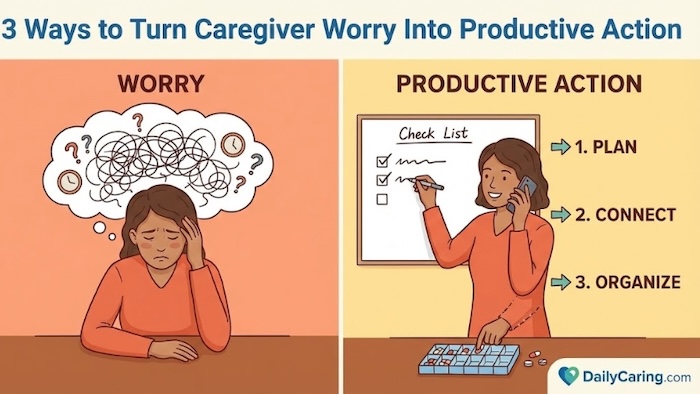
Caregiver Guilt is Common and Stressful
Caregivers often have very high (and frequently unfair) expectations for themselves.
That can add significant stress and guilt to an already demanding job, reduce your quality of life, and make it harder to care for your loved one.
Dr. Barry J. Jacobs, an AARP caregiving expert, has years of personal experience caring for his mother. In his article about caregiver guilt, he shares five valuable tips to reduce the guilt that caregiving often causes.
5 Expert Tips for Reducing Caregiver Guilt
1. Don't aim for guilt-free caregiving
Guilt is part of who we are as caregivers. There will always be a difference between what we can do and what we think we should be doing, which causes guilt.
Accept that it’s not realistic to do everything. That will help reduce your feelings of guilt.
2. Give up the fantasy of rescuing others
It’s tempting to think that if you can provide the absolute best care, your older adult will make a miraculous recovery. This sets an unrealistically high standard.
Aging and severe health conditions won’t stop affecting your loved one, even if it were possible to be the most amazing caregiver of all time.
We should aim to do our best, but keep our goals realistic and take into account the reality of our loved one's health situation.
3. Maintain balance
We have multiple people and relationships—parents, children, siblings, spouses, and friends.
Being a caregiver can take up most of our time and energy, but finding ways to maintain our social connections remains important. This balance is essential for emotional health.
4. Tolerate ambivalence
Having negative feelings is a natural part of the caregiving experience. It doesn’t mean you don’t care about your loved one – it just means you’re human.
After all, haven’t you had moments of annoyance or anger toward them before you became their caregiver?
Beating up on yourself for having negative thoughts, like resentment, anger, or irritation, isn’t fair to yourself and causes extra stress.
5. Find other motivations
When we feel guilty, we often force ourselves to do things we don’t want to do, which can make us resentful.
Working on being motivated by positive feelings, like wanting to provide care because it’s important to us, helps reduce guilt and stress.
Recommended for you:
- How to Deal with Caregiver Guilt in Dementia: 6 Tips
- 3 Reasons to Stop Feeling Guilty About a Move to Assisted Living
- Caregiver Guilt: Two Common Myths Increase Stress
About the Author

Connie is the founder of DailyCaring.com and was a hands-on caregiver for her grandmother for 20 years. (Grandma made it to 101 years old!) She knows how challenging, overwhelming, and all-consuming caring for an older adult can be. She also understands the importance of support, especially in the form of practical solutions, valuable resources, and self-care tips.













